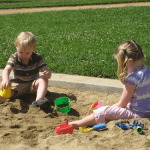
Neocate.com
Hosting a Safe Playdate: Tips for Parents Whose Children Have Friends with Food Allergies
Friends with food allergies can be a challenge for any parent, but for a parent who is not familiar with food allergies, having a food allergic child over to play may seem intimidating. This blog is intended for parents whose children do not have food allergies who would like to know more about food allergies in order to safely host a food-allergic playmate.
Meals and Snacks for friends with food allergies
Obviously, meals and snacks are the most critical times to be vigilant when you are caring for friends with food allergies. Follow these steps to keep your guest safe.
- Prior to the playdate, arrange for the child’s parents to pack enough safe foods for the time they will spend at your house. Let them know if you plan to have a certain food so that they can provide an allergy-free alternative for their child and nobody feels left out. The most important thing is to only give the child the food that their parents provided. Food allergens are often hidden ingredients and it takes a lot of time and practice to master the art of reading food labels and detecting potential allergens. Never assume a food is safe.
- Make sure to clean the surface of the kitchen or table to remove any food protein residue from earlier meals. Soaps and commercial cleansing agents work well on countertops, but dishwashing liquid is not enough.
- Be sure to wash your hands before and between handling foods. It’s important to remind the kids to wash their hands before eating as well. Use soap and water; hand-sanitizers will not get rid of food protein residues.
- When preparing food for the kiddos, be careful to avoid cross-contact, where the proteins from one food mix in with another food. Even a tiny amount is enough to cause an allergic reaction in some people. To avoid it, use separate utensils when preparing food for the kids (or yourself).
- For the younger children, be sure to monitor the kiddos during meal or snack time and explain that it’s not safe for them to share or trade foods.
Airborne Allergens
Most children’s allergic reactions occur from actually eating the food that they are allergic to so as long as you keep the kid’s foods separate, you don’t need to worry about what your family eats around them. However, some kids have airborne allergens where they can have an allergic reaction by just being near the allergen. For example, you’ve probably heard of the “peanut-free” schools or lunch tables which are intended to protect children with peanut allergies who can react by just being around other kids eating foods with peanuts. You’ll need to use extra caution with these kiddos and be sure to not have any foods containing that allergen while the child is around.
Arts and Crafts for friends with food allergies
It’s important to note that food allergens can be triggered by non-food items too. For example, common modeling doughs and many stickers are not safe for a child with a wheat allergy. For more information on allergens hidden in non-food items, refer to Christine’s blog post.
Emergency Plan for friends with food allergies
No matter how careful you are, it’s still important to know the signs and symptoms of an allergic reaction just in case exposure occurs. Exposed children present symptoms within a minute to 2-hours from exposure. If you suspect an allergic reaction has occurred, call the child’s parents immediately. If the child is having a serious allergic reaction and having trouble breathing, call 911 first, then call the parents.
Some allergic children experience anaphylaxis, a severe allergic reaction that progresses rapidly and can lead to death. These kids are usually prescribed an automatic epinephrine injector, which must be kept with them at all times. It’s up to the child’s parents to notify you if their child carries one and explain to you how to use it just in case of an emergency.






